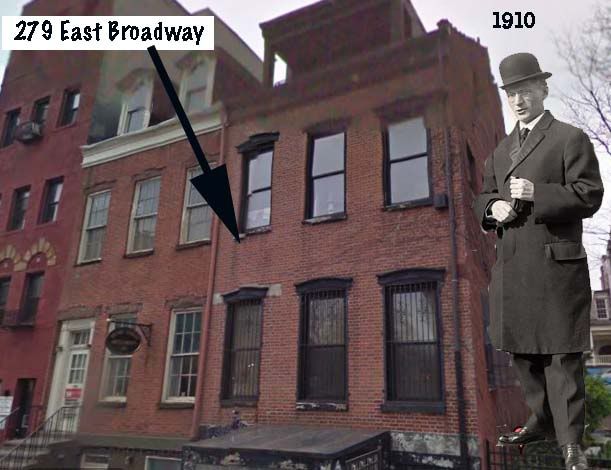Meyer London: 279 East Broadway

Meyer London (1871—1926) was an American politician from New York City. He is best remembered as one of only two members of the Socialist Party of America elected to the United States Congress.
Meyer London was born in Kalvarija, Lithuania (then part of the Russian Empire) on December 29, 1871. Meyer's father, Efraim London, was a former Talmudic scholar who had become politically revolutionary and philosophically agnostic, while his mother had remained a devotee of Judaism. His father had established himself as a grain merchant in Zenkov, a small town located in Poltava province of the Ukraine, but his financial situation was poor and in 1888 his father emigrated with Meyer's younger brother to the United States, leaving Meyer behind.
Meyer attended Cheder, a traditional Jewish primary school in which he learned Hebrew, before entering Russian-language schools to begin his secular education.[2] In 1891, when Meyer was 20, the family decided to follow his father to America so Meyer terminated his studies and departed for New York City, taking up residence in the city's largely Jewish Lower East Side.
In America, Meyer's father had become a commercial printer, doing jobs in the Yiddish, Russian, and English languages and publishing his own radical weekly called Morgenstern. Efraim London's shop was a hub of activity, bringing together Jewish radical intellectuals from throughout the city, many of whom met and influenced the printer's son with their ideas.
Meyer earned money as a tutor, taking on pupils at irregular hours and teaching literature and other topics. He later obtained a job as a librarian, a position which allowed him sufficient time to read about history and politics and to study law in his free time. Meyer also frequented radical meetings, gradually developing proficiency as a public speaker and participant in public debates.
In 1896, London was accepted to the law school of New York University, attending most of his classes at night. He completed the program and was admitted to the New York state bar in 1898, becoming a labor lawyer, taking on cases which fought injunctions or defending the rights of tenants against the transgressions of landlords. London did not handle criminal cases, but rather limited himself to matter of civil law.
In 1898, London ran for New York Assembly in the old 4th Assembly District, as the candidate of the Social Democratic Party of America, successor organization of Debs' Social Democracy.
London was active in the 1910 New York Cloakmakers Strike, during which the International Ladies' Garment Workers' Union (ILGWU) brought out 50,000 in a successful struggle for higher wages and better work conditions against their employers. In his capacity as counsel for the ILGWU, London drew up and published a communique in the name of the strike committee.[10] In this manifesto, London declared:
"We charge the employers with ruining the great trade built up by the industrious immigrants. We charge them with having corrupted the morale of thousands employed in the cloak trade.... Treachery, slavishness and espionage are encouraged by the employers as great virtues of the cloakmakers. This general strike is greater than any union. It is an irresistible movement of the people. It is a protest against conditions that can no longer be tolerated. This is the first great attempt to regulate conditions in the trade, to do away with that anarchy and chaos which keeps some of the men working sixteen hours a day during the hottest months of the year while thousands of others have no employment whatever.... We appeal to the people of America to assist us in our struggle."
London argued against an injunction issued against the strikers before the New York Supreme Court en route to a victory of the strikers after a labor action lasting the better part of two months.
In January 1916, London was joined by Socialist Party leaders James Maurer and Morris Hillquit in a meeting with President Woodrow Wilson trying to forestall American entry into World War I.
London's place in the cloakmakers' strike made him one of the best-known public faces of the Socialist Party in New York City and over the course of three runs for Congress he gradually constructed a winning coalition, emerging victorious despite the violence and fraud practiced by the campaign of his Tammany Hall-supported Democratic opponent in the election of 1914. London thus became the second Socialist elected to Congress, following Wisconsin's Victor Berger.
As a Congressman, Meyer London was one of 50 representatives and six senators to vote against entry into World War I. Once America was at war, however, London felt obliged to support the nation's efforts in the conflict. He strongly opposed the Espionage Act of 1917 and the Sedition Act of 1918, which made criticism of the president or the war a crime. These actions angered his constituency, London said, "I wonder whether I am to be punished for having had the courage to vote against the war or for standing by my country’s decision when it chose war."


No comments:
Post a Comment